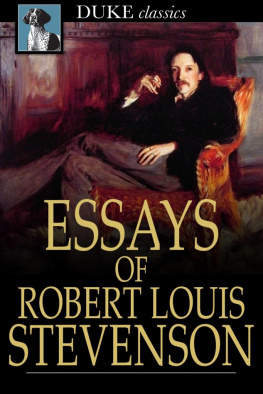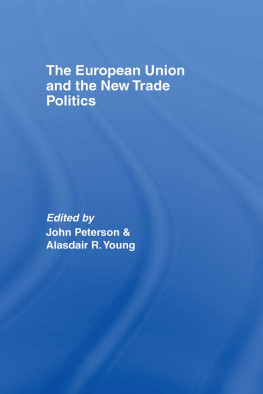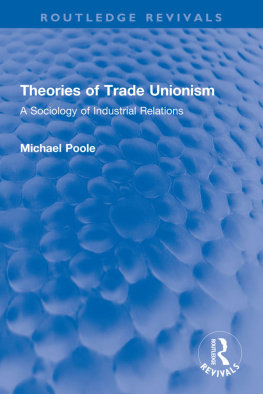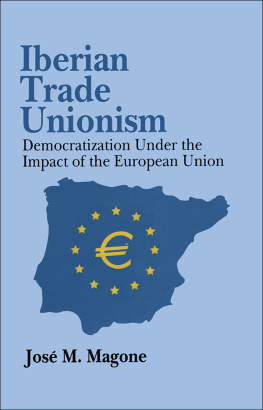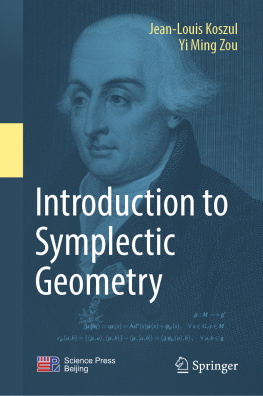The Emergence of European Trade Unionism
First published 2004 by Ashgate Publishing
Reissued 2018 by Routledge
2 Park Square, Milton Park, Abingdon, Oxon, OX14 4RN
711 Third Avenue, New York, NY 10017, USA
Routledge is an imprint of the Taylor & Francis Group, an informa business
Jean-Louis Robert, Antoine Prost, Chris Wrigley and the contributors, 2004
The editors have asserted their moral right under the Copyright, Designs and Patents Act, 1988, to be identified as the editors of this work.
All rights reserved. No part of this book may be reprinted or reproduced or utilised in any form or by any electronic, mechanical, or other means, now known or hereafter invented, including photocopying and recording, or in any information storage or retrieval system, without permission in writing from the publishers.
A Library of Congress record exists under LC control number: 00053130
Notice
Product or corporate names may be trademarks or registered trademarks, and are used only for identification and explanation without intent to infringe.
Publishers Note
The publisher has gone to great lengths to ensure the quality of this reprint but points out that some imperfections in the original copies may be apparent.
Disclaimer
The publisher has made every effort to trace copyright holders and welcomes correspondence from those they have been unable to contact.
ISBN 13: 978-0-815-39771-7 (hbk)
ISBN 13: 978-1-351-14688-3 (ebk)
Contents
Chris Wrigley
Thomas Welskopp in cooperation with Odette Hardy-Hmery
Eric Nijhof in cooperation with John Barzman and John Lovell
Jean-Claude Daumas, Rmy Cazals, Marlene Ellerkamp and Alan Fowler
Karl Ditt, Giuseppe M. Longoni and Peter Scholliers
John Belchem, with the assistance of Karl Heinrich Pohl and Vincent Robert
Gita Deneckere, Marie-Louise Goergen, Inge Marssolek, Danielle Tartakowsky and Chris Wrigley
Antoine Prost and Manfred Bock
Norbert Olszak and Chris Wrigley
Marie-Genevive Dezs, Kenneth Lunn, Arthur McIvor and Klaus Tenfelde
Michel Dreyfus, Sandrine Kott, Michel Pigenet and Noel Whiteside
Peter Berkowitz, Rebecca Gumbrell, Richard Hyman, Michel Pigenet and Michael Schneider
Guide
Labour history has often been a fertile area of history. Since the Second World War its best practitioners such as E. P. Thompson and E. J. Hobsbawm, both Presidents of the Society for the Study of Labour History have written works which have provoked fruitful and wide-ranging debates and further research, and which have influenced not only social history but history generally. These historians, and many others, have helped to widen labour history beyond the study of organised labour to labour generally, sometimes to industrial relations in particular, and most frequently to society and culture in national and comparative dimensions.
The assumptions and ideologies underpinning much of the older labour history have been challenged by feminist and later by post-modernist and anti-Marxist thinking. These challenges have often led to thoughtful reappraisals, perhaps intellectual equivalents of coming to terms with a new post-Cold War political landscape.
By the end of the twentieth century, labour history had emerged reinvigorated and positive from much introspection and external criticism. Very few would wish to confine its scope to the study of organised labour. Yet, equally, few would wish now to write the existence and influence of organised labour out of nations histories, any more than they would wish to ignore working-class lives and focus only on the upper echelons.
This series of books provides reassessments of broad themes of labour history as well as some more detailed studies arising from recent research. Most books are single-authored but there are also volumes of essays centred on important themes or periods, some arising from major conferences organised by the Society for the Study of Labour History. The series also includes studies of labour organisations, including international ones, as many of these are much in need of a modern reassessment.
Chris Wrigley
Society for the Study of Labour History
University of Nottingham
The European scholars contributing to this volume are John Barzman, John Belchem, Peter Berkowitz, Manfred Bock, Rmy Cazals, Jean-Claude Daumas, Gita Deneckere, Marie-Genevive Dezs, Karl Ditt, Michel Dreyfus, Marlene Ellerkamp, Alan Fowler, Marie-Louise Goergen, Rebecca Gumbrell, Odette Hardy-Hmery, Richard Hyman, Sandrine Kott, Giuseppe M. Longoni, John Lovell, Kenneth Lunn, Inge Marssolek, Arthur McIvor, Eric Nijhof, Norbert Olszac, Michel Pigenet, Karl Heinrich Pohl, Antoine Prost, Jean-Louis Robert, Vincent Robert, Michael Schneider, Peter Scholliers, Danielle Tartakowsky, Klaus Tenfelde, Thomas Welskopp, Noel Whiteside and Chris Wrigley.
Chris Wrigley
The renaissance of labour history in recent years has had several aspects, one of the most important being the fresh insights arising from comparative studies. There have been numerous excellent single-authored comparative studies This collection contains studies of the pre-1914 development of trade unions in Europe written by teams (or at least pairs) of historians of different nationalities.
This international study of European trade unionism was initiated by an international group of scholars, including Friedhelm Boll, Antoine Prost and Jean-Louis Robert, and the meetings of the authors were held at the Sorbonne under the aegis of Antoine Prost and Le Centre de Recherches sur lHistoire des Mouvements Sociaux et du Syndicalisme. At preliminary meetings each team of authors set their agenda of issues to explore; each author then prepared appropriate material and, at a further meeting, comparisons were made collectively by each group, before the joint paper was written. Hence, this collection of essays represents sustained collaborative work. The essays are based on specialist knowledge of archival materials as well as a range of secondary sources often known to few beyond one country.
provides assessments of major aspects of industrial relations. Several of the authors warn of the hazards and difficulties of attempting multinational comparisons. Nevertheless, the essays in both parts of the book provide fresh insights into the emergence of European trade unionism.
The team of writers on textiles () emphasise that the differences which emerge from their analysis are not necessarily national ones and urge more interregional comparative analysis. This is very good advice. For some parts of Europe one can go further, as labour markets were transnational and, for such instances, national studies could be too restrictive.
The economic sector studies in this book provide a range of ), the authors assess a range of structural factors affecting trade union growth, including whether parts were old or new, the types of cargo handled and the competitiveness of the labour market. The chapters (3 and 4) on textiles are among those which bring out the weakening effect on trade union growth of the presence of foreign labour (Alsatians in the case of Elbeuf) and of Catholic loyalties.
As for large provincial cities (), the team of writers argue that while they were not archetypal nineteenth-century strongholds of trade unionism, these urban areas did not necessarily impede trade union development. Lyon, for instance, had a rich radical heritage which included the past struggles of 1831 and 1834. Such radical traditions Paris and later St Petersburg are well-known examples were very important in assisting radical mobilisations. Munich also had its heritage of being a relatively radical centre of more liberal (than Prussia) German states.




